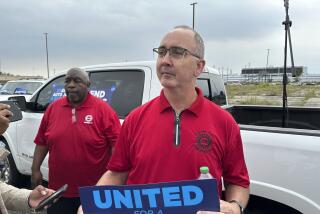U.S. Calls Autos No. 1 Priority
- Share via
DETROIT — President Clinton’s chief trade negotiator said Friday that the automobile industry is a top priority of the new Administration and pledged cooperation to help solve vexing trade problems.
“I came here to Detroit because it’s the No. 1 priority not only on my list but on the President’s list,” said U.S. Trade Representative Mickey Kantor, who met with chiefs of the Big Three car makers as well as the industry’s main union.
Kantor met with United Auto Workers President Owen Bieber for about an hour before sitting down to lunch with Ford Motor Co. Chairman Harold Poling, Chrysler Corp. Chairman Robert Eaton and General Motors Corp. Executive Vice President William Hoglund at Ford’s headquarters.
Speaking to reporters after the meeting with Bieber, Kantor said the vitality of America’s car industry is a key part of Clinton’s economic recovery plan.
He said the auto industry, with its high-skill, high-wage jobs, is “trying to lead this nation out of recession.”
But the industry has a way to go. Detroit’s Big Three car makers lost a record $30.2 billion in 1992, with only Chrysler reporting a profit.
About one in seven jobs in the United States is connected to the auto industry, making it one of the most powerful manufacturing segments of the economy.
Kantor said the Treasury Department is studying a proposal by car makers to increase the tariff on Japanese minivans and sport utility vehicles, but no formal decision has been made to proceed.
The Big Three have been pressing the government to reclassify the vehicles as trucks instead of cars, which would increase tariffs tenfold to 25% and give the domestic car makers a huge price advantage over Japanese competitors.
Critics say U.S. car makers would raise prices if the tariffs were increased, but Chrysler has pledged to limit any increases on its minivans to the rate of inflation or less.
Kantor said Washington needs to develop a coordinated effort with Detroit’s car makers and organized labor to solve the problems between the United States and Japan.
More to Read
Inside the business of entertainment
The Wide Shot brings you news, analysis and insights on everything from streaming wars to production — and what it all means for the future.
You may occasionally receive promotional content from the Los Angeles Times.










